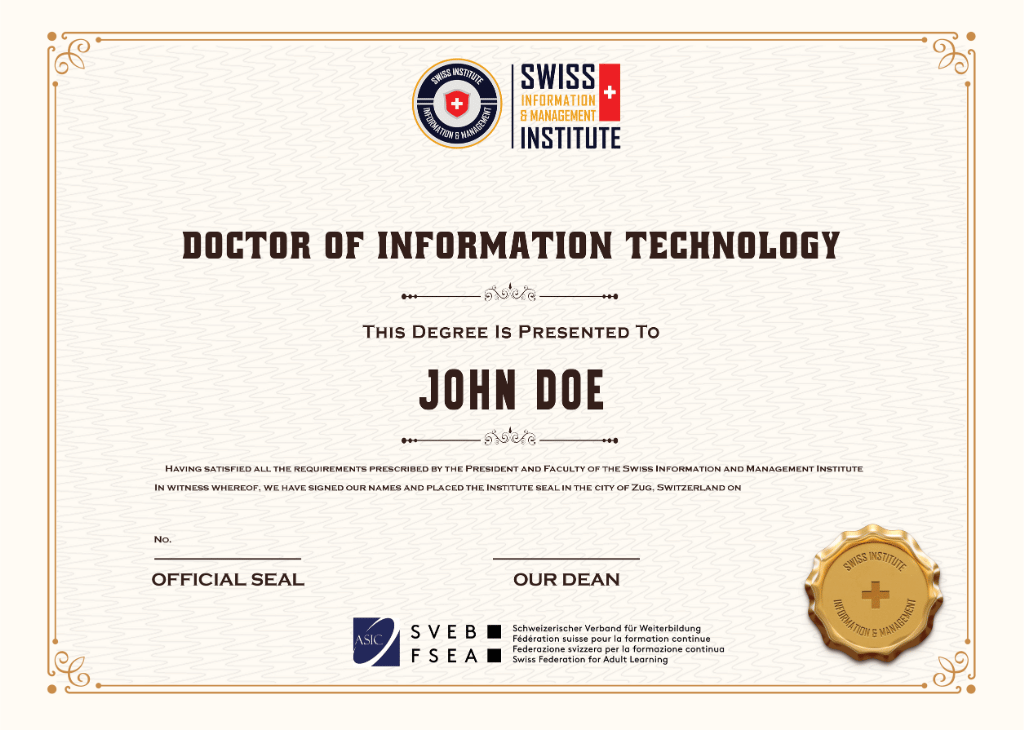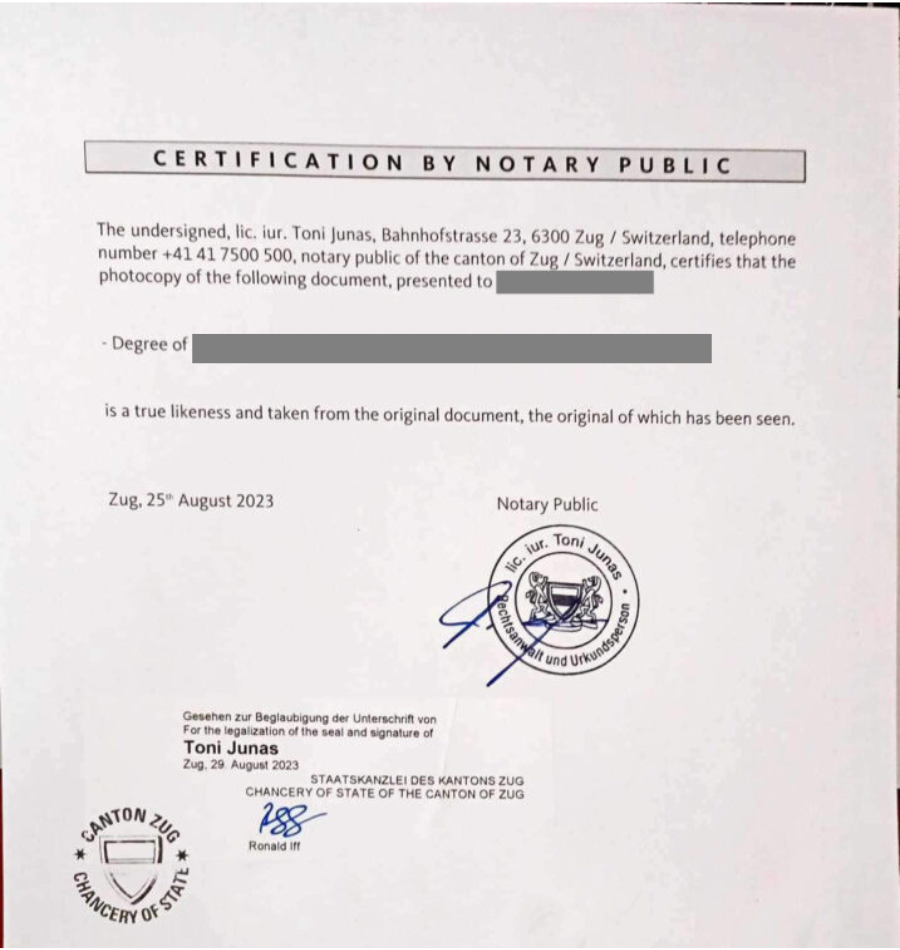Distinction
Student visa for full-time students and the possibility to bring dependents while studying in Malaysia.

The Ph.D. in Information Technology Studies at AMU’s Malaysia campus—offered by Asia Metropolitan University (AMU), ranked 72nd in Asia—is powered by SIMI Swiss.
The Ph.D – Information Technology Studies program focuses on addressing real-world challenges in the field of information technology, generating new knowledge, and providing effective solutions to drive innovation and enhance technological performance.

Student visa for full-time students and the possibility to bring dependents while studying in Malaysia.
The program is widely recognized by the business community and partners, helping to optimize the use of the diploma after graduation.
Before beginning your doctoral journey, candidates usually have some initial research orientations, but you are not constrained or required to be exact from the outset. With guidance from your supervisor, you will gradually identify the most suitable topic. The suggestions below are for reference only, and you are completely free to choose a different research direction.
Some suggested research directions in Information Technology:
1. Artificial Intelligence & Machine Learning
2. Data Science & Big Data Analytics
3. Cybersecurity & Information Assurance
4. Cloud Computing & Edge Computing
5. Internet of Things (IoT) & Smart Systems
6. Human–Computer Interaction (HCI) & UX
7. Software Engineering & Systems Development
8. IT in Business & Society
9. Emerging Research Trends
This course is designed to enhance existing knowledge of research methods by introducing complex research design and advanced techniques for analyzing and interpreting literature, as well as higher-level methods for analyzing both qualitative and quantitative data.
Upon completing the course, doctoral students will be confident in developing a Research Proposal and initiating the implementation of their doctoral thesis.
The Research Plan outlines the orientation, timeline, resources, and implementation
strategies to support doctoral students in completing their thesis in a scientific and
effective manner. It serves as a roadmap for the entire research journey and ensures
feasibility and coherence before proceeding to the Research Proposal stage.
Doctoral students will participate in Colloquium 1, organized by AMU and SIMI Swiss. Participation in the Colloquium is mandatory, and students can attend in various formats: on-campus or online.
The Colloquium serves as a platform for doctoral students to expand their specialized knowledge, engage with faculty members, supervisors, and fellow students to discuss and present their research directions and findings.
At the conclusion of the Colloquium 1, doctoral students will have the opportunity to meet individually with their supervisor to finalize their Research Proposal before proceeding to the defense stage.
Once the Research Proposal is completed, doctoral students will defend their proposal before the academic committee of AMU and SIMI Swiss. This defense allows doctoral students to receive valuable feedback and ensures their research aligns with the highest academic standards.
Successfully defending the proposal is a key milestone in the doctoral journey, setting the foundation for the subsequent phases of research and thesis development.
Doctoral students will continue developing their Research Proposal into a complete doctoral thesis under the guidance and support of the following:
Doctoral students will participate in Colloquium 2, organized by AMU and SIMI Swiss. Participation in the Colloquium is mandatory, and students can attend in various formats: on-campus or online.
The Colloquium serves as a platform for doctoral students to expand their specialized knowledge, engage with faculty members, supervisors, and fellow students to discuss and present their research directions and findings.
At the conclusion of Colloquium 2, doctoral students will have the opportunity to meet individually with their supervisors to finalize their Thesis before proceeding to the final defense before the academic committee of AMU and SIMI Swiss.
After completing their research, doctoral students will bind their thesis and submit it to the academic committee of AMU and SIMI Swiss.
The students will then proceed to defend their doctoral thesis before the academic committee of AMU and SIMI Swiss.
Following the defense, students will receive feedback for potential improvements (if any) from the academic committee. Based on this feedback, they will refine their research until it is fully complete.
During this finalization process, students will continue to receive guidance from their supervisors and support from the academic support system.
After completing their thesis, AMU offers an optional training module on academic
publishing skills. This equips doctoral students with techniques for converting
dissertations into publishable articles and enhances their academic profile.
Doctoral students submit their research for publication in relevant journals, preparing
manuscripts according to journal requirements and addressing editorial feedback.
For those seeking additional publications beyond program requirements, support is
available for submission to ISI/SCOPUS-indexed journals, including journal selection
consultation. Doctoral students cover associated service fees, while the academic team
provides guidance and support during the process.
Structure: The Modular Supervision Model organizes the research supervision process by dividing it into distinct modules, with each module (such as a chapter or specific section) assigned to a specialist in that particular area. For example, one supervisor may oversee the introduction and literature review, while another focuses on methodology, and a third guides the data analysis and results sections. This structured approach ensures that each part of the research receives expert attention tailored to its specific requirements.
Benefits:
Conclusion: The Modular Supervision Model offers a structured and flexible approach to doctoral supervision, leveraging specialized expertise to enhance the quality and efficiency of the research process. By dividing supervision responsibilities into manageable modules, this model ensures comprehensive coverage, fosters collaboration, and provides personalized support, ultimately contributing to the successful completion of high-caliber doctoral research.
SIMI Swiss understands that providing support and guidance to doctoral students throughout the research process and international publication not only reduces unnecessary stress and challenges for the doctoral students but also contributes valuable and high-quality research to society. With the unique Modular Supervision Model, doctoral students will gradually complete their PhD research, publish international papers, and meet the exceptionally rigorous standards of SIMI Swiss.
Learn more about the Research Supervision Process HERE.
SIMI Swiss’s Doctorate by Publication program is renowned for its guidance and support, helping students not only complete their research but also successfully publish two international papers. The international publication guidance process at SIMI Swiss is implemented through the following steps:
After submitting a research paper to an international journal, the editorial board typically provides feedback, often suggesting revisions to improve the paper before it can be accepted for publication. At SIMI Swiss, students receive comprehensive support to successfully navigate this critical stage of the publication process. Support activities include:
This process ensures that their research meets the high standards of international journals, enhancing both their academic credibility and professional expertise.
In addition to the entry requirements, candidates applying to the program are also assessed for their suitability by the admissions committee before joining the program to ensure that they can acquire and benefit from the program.
To enroll in this program, learners must be over 24 years old and meet at least one of the following criteria:
Depending on the individual circumstances of the doctoral student, they may choose to apply for a full-time student visa or opt out. It is important to note that, if applying for a full-time student visa, doctoral students must comply with the regulations set by the Malaysian government, which include a health examination, a minimum residency period in Malaysia, and the payment of the student visa processing fee.
Group 1: Doctoral students Applying for a Full-Time Student Visa
Group 2: Doctoral students Not Applying for a Full-Time Student Visa
We understand that pursuing an accredited postgraduate program can be both exciting and challenging, especially for busy adult learners. To help you overcome these challenges, we’ve created the SIMI Swiss Supporting Systems, designed to guide you through any difficulties during your studies.
For a full overview of the support available, be sure to watch our informative videos, offering help at every stage of your academic journey.
StudyAbroader, a member of SIMI Swiss, is responsible for supporting Malaysia study-abroad activities for learners of SIMI Swiss Asia Campus programs. StudyAbroader is not an intermediary agency, so learners do not pay intermediary fees and may submit applications directly to the university.
References:
SIMI is the first higher education institute in Zug, Switzerland, to achieve comprehensive international accreditations at both the organizational and program levels. The video below guides you through the step-by-step process of verifying and checking SIMI Swiss's accreditations and recognitions. All SIMI Swiss programs, owned by SIMI Swiss, benefit from these quality standards.

SVEB Switzerland (Schweizerischer Verband für Weiterbildung) is the Swiss Federation for Adult Learning and serves as the national umbrella organization for adult education in Switzerland. SVEB is recognized as the leading authority in Switzerland for promoting and supporting lifelong learning and professional development through a wide range of educational programs and certifications.
Check the SIMI programs on SVEB HERE.
In Switzerland, a Notary Public can certify copies of academic degrees and diplomas by verifying their authenticity and confirming that they match the original document. This notarized certification is often required for legal, academic, or professional purposes, such as further studies, job applications, or immigration procedures.
For international use, a notarized degree may also require an Apostille from the relevant Swiss authority (usually the cantonal State Chancellery) to ensure its recognition in countries that are part of the Hague Apostille Convention.

Note: The information provided above is accurate at the time of publication. However, the content is subject to change in accordance with adjustments to the laws of each country and may be updated without prior notice.




